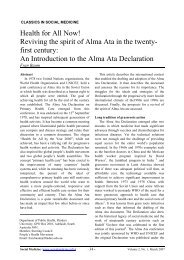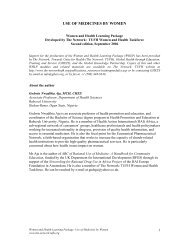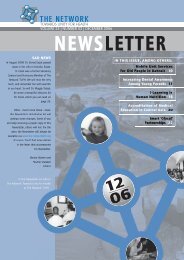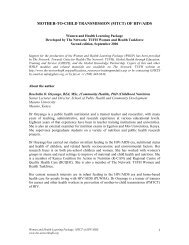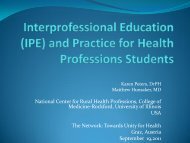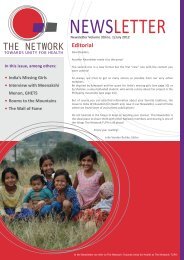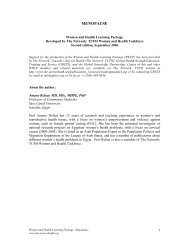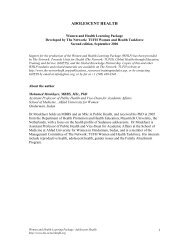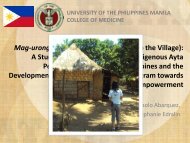Tamas Fülöp Award - The network - Towards Unity For Health
Tamas Fülöp Award - The network - Towards Unity For Health
Tamas Fülöp Award - The network - Towards Unity For Health
You also want an ePaper? Increase the reach of your titles
YUMPU automatically turns print PDFs into web optimized ePapers that Google loves.
POSITION PAPER<br />
<strong>The</strong> Network: TUFH Executive Committee decided to undertake the writing of a series of ‘Position Papers’ on issues that are<br />
closely related to the aims and objectives of our organisation. <strong>The</strong>y must be seen as starting points for further discussion.<br />
You may contribute by submitting a letter to secretariat@<strong>network</strong>.unimaas.nl, by participating in sessions on these issues at<br />
Network: TUFH Conferences, or responding to the electronic versions of these Position Papers at the Network: TUFH’s website<br />
(www.the-<strong>network</strong>tufh.org/publications_resources/positionpapers.asp).<br />
Interprofessional<br />
Education and Practice<br />
<strong>The</strong> taskforce Interprofessional Education<br />
drive has been repeated by other legislative<br />
provement in service design and provision,<br />
(IPE) changed its title from multiprofessional<br />
and policy requirements in several different<br />
through improvements in interprofessional<br />
to interprofessional in order to emphasize<br />
countries.<br />
learning and improved integration of services<br />
the importance of structured learning with,<br />
and care provision.<br />
from and about different professions, by<br />
<strong>The</strong> link between multiprofessional and in-<br />
comparison with simply sharing a learning<br />
terprofessional learning experiences and<br />
<strong>The</strong> increased involvement of service users<br />
environment.<br />
enhanced collaborative ability within a mul-<br />
and carers in the design and implementa-<br />
<strong>The</strong> term ‘multiprofessional’ is used in the<br />
tiprofessional team or between agencies has<br />
tion of education programmes for health<br />
paper to denote a team, training ward or<br />
student group which contains representation<br />
from a number of professions.<br />
Mission of IPE Taskforce<br />
To enhance the quality of interprofessional<br />
education, learning and practice by drawing<br />
together experience(s) from the international<br />
context.<br />
Learning Together to Work Together<br />
<strong>The</strong> necessity for collaboration between<br />
health and social care professions and health<br />
and welfare/social care agencies arises from<br />
the multiple needs of specific groups of service<br />
users, the variety of required service responses<br />
to these and the need for effective<br />
information exchange and discussion with<br />
regards to care planning and delivery. <strong>The</strong><br />
lack of operation of functional links between<br />
agencies has led to a failure of service and<br />
increased risk to service users. <strong>The</strong> inability of<br />
multiprofessional teams to communicate has<br />
yet to be fully evidenced, but examples have<br />
been identified which indicate a change in<br />
practice which is sustainable following structured<br />
interprofessional learning experience<br />
within a multiprofessional student population<br />
e.g. (Dickinson & Carpenter, 2005).<br />
Evaluation of studies which focus on such<br />
interprofessional learning experience have<br />
been gathered by Freeth et al. (2002), Barr et<br />
al. (2005) and Hammick et al. (2007). Much<br />
of the interprofessional education discussed<br />
within these studies is carried out within the<br />
workplace and is not accredited by a college<br />
or university. <strong>The</strong> benefit of explicit relevance<br />
to practice can also be gained through placement<br />
experience within a multiprofessional<br />
team and also through a joint placement<br />
experience within a programme leading to<br />
professional registration.<br />
<strong>The</strong> Service User<br />
While the IPE taskforce has a specific focus,<br />
professionals is a feature of interprofessional<br />
education in the UK and has been addressed<br />
in the recent UK Department of <strong>Health</strong> project<br />
Creating an Interprofessional Workforce.<br />
Implementation of Interprofessional<br />
Education / Community and Work-Based<br />
Education<br />
A variety of learning and teaching approaches<br />
are relevant here, amongst them<br />
problem-based learning, collaborative enquiry,<br />
and continuous quality improvements<br />
(Barr, 2003) and also case-based learning<br />
(Lindquist et al., 2005). “Practice-based<br />
learning is seen as essential and can take<br />
many forms; observational study, shadowing,<br />
cross professional placements and experience<br />
on training wards” (Barr, 2003). <strong>The</strong> timing<br />
of interprofessional education continues to<br />
be a topic of discussion as is the issue of the<br />
importance of embedding or not embedding<br />
uniprofessional identity before engaging<br />
with interprofessional learning.<br />
J U L Y 2 0 0 8 N E W S L E T T E R N U M B E R 0 1 | V O L U M E 2 7<br />
also led to a failure to respond to the needs<br />
there are substantial overlaps of interest with<br />
of service users effectively (Conway & Mac-<br />
other taskforces focused on particular groups<br />
<strong>The</strong> international context in which the IPE<br />
millan, 2003).<br />
of service users e.g Care of the Elderly, and<br />
taskforce functions recognises a number of<br />
Women’s <strong>Health</strong>. In addition, the delivery<br />
different models of community and work-<br />
<strong>The</strong> importance of multiprofessional (now<br />
of integrated service is an issue for the IPE<br />
based education, ranging from a joint place-<br />
seen as interprofessional) learning and educa-<br />
taskforce and for specific areas of health<br />
ment between, for example, social work<br />
tion for health professionals was emphasized<br />
e.g. Public <strong>Health</strong>, and Primary Care. <strong>For</strong><br />
and community nursing students as part of<br />
in 1988 by the World <strong>Health</strong> Organization<br />
this reason this taskforce is interested in col-<br />
pre-registration education to a uniprofes-<br />
(WHO, 1988) in their statement Learning<br />
laboration with other areas of <strong>The</strong> Network:<br />
sional community-based experience within a<br />
Together to Work Together for <strong>Health</strong> and this<br />
TUFH in order to encourage and enable im-<br />
medical education programme. <strong>The</strong>re is an op-<br />
7



